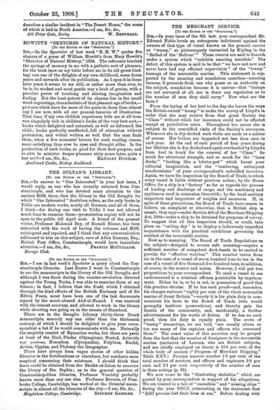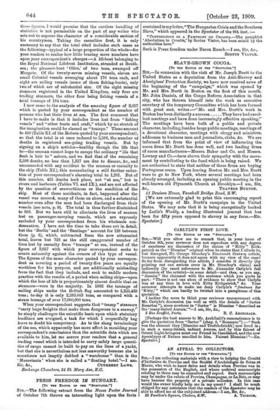THE MERCHANT SERVICE.
[To THE EDITOR OF THE "SPECTATOR.'] Sin,—In your issue of the 9th inst. your correspondent Mr. Edward Noble levels an outrageous indictment against the owners of that type of vessel known as the general carrier or "tramp," so picturesquely travestied by Kipling in the "Ballad of the Bolivar." These owners are said to flourish under a system which "exhibits amazing scandals." The defect of this system is said to be that "we have not now and never have had any efficient supervision" of the "tramp" tonnage of the mercantile marine. This statement is sup- ported by the amazing and scandalous assertion—amazing because it proceeds from one who poses as an authority on the subject, scandalous because it is untrue—that "tramps are not surveyed at all, nor is there any regulation as to the number of men they shall carry." Now what are the facts From the laying of her keel to the day she leaves the ways the British-owned " tramp " is under the survey of Lloyd's in order that she may receive from that great Society the " Class " without which her insurance could not be effected except at prohibitive rates. Throughout her career she is subject to the unnotified visits of the Society's surveyors. Whenever she is dry-docked such visits are made as a matter of course. Her boilers are inspected not less than once in each year. At the end of each period of four years during her lifetime she is dry-docked and again overhauled by Lloyd's from keel to truck for the renewal of her "Class." So much for structural strength, and so much for the "lame ducks" "leaking like a lobster-pot" which haunt your editorial imagination, and the "lumbering, unbuoyant anachronisms" of your correspondent's unbridled invective. Again, we have the inspection by the Board of Trade, to which every vessel is liable without previous notice ; by the Home Office, for a ship is a "factory" so far as regards the process of loading and discharge of cargo, and the machinery and
appliances used in connexion therewith ; by the local sanitary inspectors and inspectors of weights and measures. If, in spite of these precautions, the Board of Trade have reason to believe, on complaint or otherwise,. that a British ship is unsafe, they may—under Section 4.59 of the Merchant Shipping Act, 1894—order a ship to be detained for purposes of survey. To suggest that all this inspection should, or could, take place on "sailing day" is to display a ludicrously imperfect acquaintance with the practical conditions governing the conduct of the mercantile marine.
Now as to manning. The Board of Trade Regulations on the subject—designed to secure safe manning—require a sufficient number of competent deck-hands to be carried to provide for "effective watches." This number varies from six in the case of a vessel of seven hundred tons to ten in the case of a vessel of five thousand five hundred tons, in addition, of course, to the master and mates. However, I will put two propositions to your correspondent. To send a vessel to sea undermanned is a criminal offence, punishable by imprison- ment. Either he is, or he is not, in possession of proof that this practice obtains. If he has such proof—and, remember, his charges embrace "eighty per cent. of the whole mercantile marine of Great Britain "—surely it is his plain duty to com- municate his facts to the Board of Trade (who would promptly institute prosecutions), and thereby gain the thanks of the community, and, incidentally, a further advertisement for his works of fiction. If be has no such proof, then his duty is equally plain. The crews of " tramp " steamships, we are told, "are usually aliens, so too are many of the captains and officers who command them." The exact value of this assertion may be gauged from the fact that the number of foreigners in the mercantile marine (exclusive of Lascars, who are British subjects, and are chiefly employed on liners) is 13.6 per cent, of the whole body of seamen (" Progress of Merchant Shipping," Table XXV.) Foreign masters number 1.3 per cent, of the total number of masters, and officers and engineers 2.8 per cent. and 2.1 per cent, respectively of the number of men in these ratings (p. 81).
We now come to the "illustrating statistics" which are quoted by your correspondent in support of his allegations. We are treated to a tale of "casualties " and "missing ships" during the year 1900-7, culminating in the statement that "3,057 persons lost their lives at sea." Before dealing with
these figures, I would premise that the careless handling of statistics is not permissible on the part of any writer who sets out to asperse the character of a considerable section of his countrymen. Taking the casualties first, it is only necessary to say that the total cited includes such cases as the following—typical of a large proportion of the whole—for your readers to realise how little bearing mere numbers have upon your correspondent's charges :—A lifeboat belonging to the Royal National Lifeboat Institution, stranded at South- sea ; the pleasure-boat Olive,' of two tons, swamped off Margate. Of the twenty-seven missing vessels, eleven are small Colonial vessels averaging about 170 tons each, and eight are sailing vessels (some of them fishing-boats), only two of which are of substantial size. Of the eight missing steamers registered in the United Kingdom, only four are trading steamers, the other four being fishing vessels of a total tonnage of 184 tons.
I now come to the analysis of the amazing figure of 3,057 which is quoted by your correspondent as the number of persons who lost their lives at sea. The first comment that I have to make is that it includes lives lost from "fishing vessels" and "other boats and craft," which by no stretch of the imagination could be classed as "tramps." These amount to 459 (Table XI. of the Return quoted by your correspondent), so that the total is at once reduced to 2,598, the number of deaths in registered sea-going trading vessels. But by signing on a ship's articles—healthy though the life that be—the seaman cannot hope to escape the ordinary "ills that flesh is heir to" ashore, and we find that of the remaining 2,598 deaths, no less than 1,317 are due to disease, &c., and unconnected with any accident to the seaman or casualty to the ship (Table XL), this necessitating a still further reduc- tion of your correspondent's alarming total to 1,281. But of this number, 425 deaths took place, not "at sea," but in rivers and harbours (Tables VI. and IX.), and are not affected by the question of seaworthiness or the condition of the ship. Most of these accidents, in fact, happened after the vessel was moored, many of them on shore, and a substantial number even after the men had been discharged from their vessels (see note, p. 9). The total is thus further diminished to 856. But we have still to eliminate the lives of seamen lost on passenger-carrying vessels, which are expressly excluded by your correspondent from his wholesale con- demnation. I have not the time to take these out in detail, but the 'Berlin' and the 'Santiago' account for 128 between them (p. 6), which, subtracted from the now attenuated total, leaves but 728 as the still exaggerated number of lives lost by casualty from " tramps " at sea, instead of the figure of 3,057 with which your correspondent seeks to create animosity against the owners of this type of vessel. The figures of the same character quoted by your correspon- dent as covering a period of twenty-five years are equally worthless for his purpose, and are additionally misleading from the fact that they include, and seek to saddle modern practice with the results of, a period when sailing ships—upon which the loss of life is proportionately almost double that on steamers—were in the majority. In 1882 the tonnage of sailing ships under the British flag amounted to 5,225,439 tons ; to-day it is only 2,283,063 tons, as compared with a steam tonnage of over 17,000,000 tons.
When your correspondent suggests that "tramp " steamers "carry huge freights that make them dangerous in a seaway," he simply challenges the scientific basis upon which statutory loadlines are aesigned, a task for which I respectfully beg leave to doubt his competency. As to the slang terminology of the sea, which apparently has more effect in moulding your correspondent's conclusions than the scientific data which are available to him, let me assure your readers that a general trading vessel which is intended to carry safely large quanti- ties of cargo cannot be built to pay on the lines of a yacht, but that she is nevertheless not less seaworthy because she is sometimes not inaptly dubbed a " warehouse " than is the ' Mauretania' when she is called a "floating hotel."—I am, Exchange Chambers, 24 St. Mary Axe, E.C.











































 Previous page
Previous page